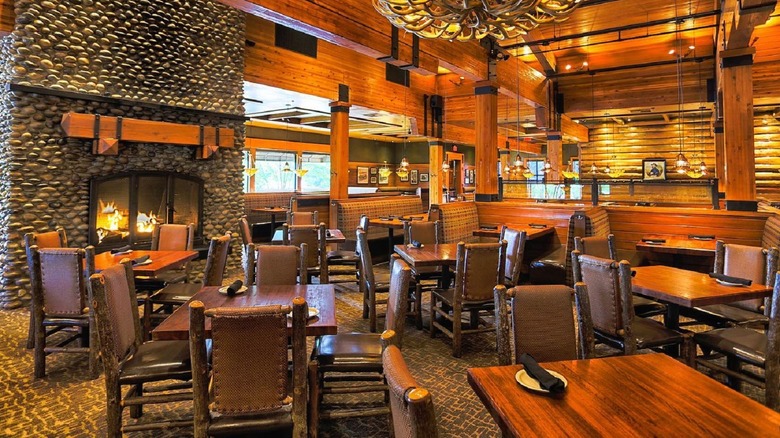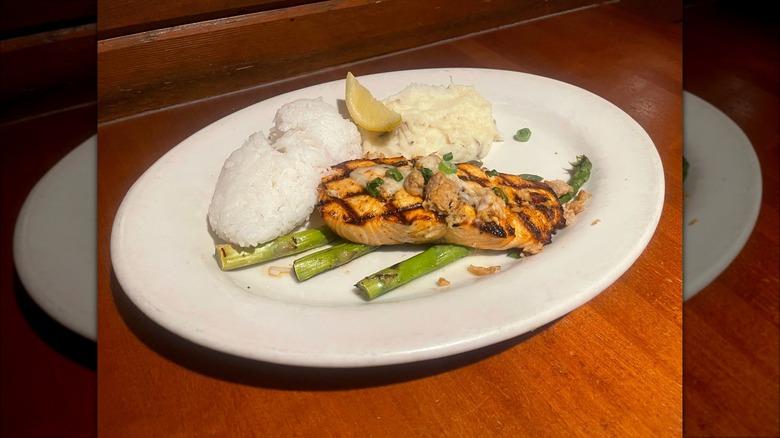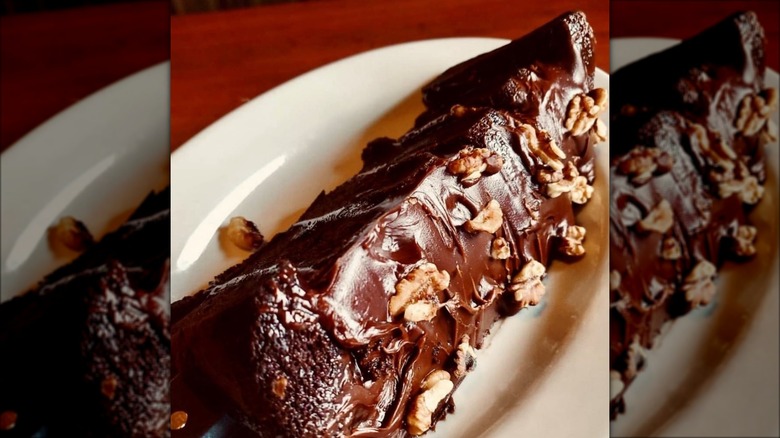Claim Jumper Steakhouse & Bar Is A Gem (That I'll Never Pay To Eat At Again)
If you've never heard of Claim Jumper Steakhouse & Bar, you're not alone. Before leaving the Midwest for Southern California, I hadn't either. The most likely reason for this is pretty straightforward: Claim Jumper is a West Coast business. (That the brand is concentrated along the Pacific isn't surprising, given it was founded in the Golden State.) What's actually surprising is that Claim Jumper has existed for nearly half a century, yet its locations only span five states.
To be fair, Claim Jumper went bankrupt during the early 2010s, which likely explains its smaller presence on the restaurant chain scene, at least compared to other franchises, and has since shrunk dramatically. As of 2010, there were 45 Claim Jumper units — a far cry from today's dozen. So, is this declining restaurant business even worth trying?
Simply put, I had a heck of a strong recommendation. My fiancé grew up in SoCal, and still fervently recalls fond childhood memories of her family splurging on Claim Jumper. While I grew up in Chicagoland firmly believing Olive Garden was a real treat, my fiancé pined after Claim Jumper's Six-Layer Chocolate Motherlode Cake, a decadence she was never allowed to order.
With that in mind, I told my fiancé I would take her to finally obtain that treasure ... but really, I just wanted to try Claim Jumper's steaks, cocktails, and desserts myself. That way, I could finally uncover this chain's deal — and more importantly, figure out if Claim Jumper is merely some struggling West Coast enterprise or something the rest of the country is unknowingly missing out on.
Is Claim Jumper a culinary goldmine?
For the uninitiated, Claim Jumper takes inspiration from the California Gold Rush. Most of its ambiance is standard for that fine line between fancy and casual dining. The location I went to has lots of understated brick, metal, and neutral-tone fabrics, as well as glass dividers, shaded lamps, and wide-screen TVs. In addition to that decorative fare are illustrations of gold miners and other frontier folk. A few more Wild West-themed nods in the menu's design aside, it's clear Claim Jumper primarily wishes to position itself as accessible yet exceptional to potential patrons.
In most regards, Claim Jumper succeeds — especially when it comes to food. Like the first nugget of gold discovered by a prospector, our Bonanza Platter starter featuring fried zucchini, loaded potatoes, mozzarella sticks, and spinach dip, was a tantalizing harbinger of what was to come. The pomegranate mojito and raspberry martini were richly sweeter still. Next, we struck gold with surf 'n' turf; as my fiancé savored a perfectly cooked steak covered in lobster beurre blanc, I enjoyed buttery crab and salmon with tender sides. Finally, we hit the motherlode, struggling to make even a mere dent in the enormous slice of fudgy, nutty cake that ended our meal. (Yes, it was the chocolatey cake that'd eluded my fiancé for so long — its six layers were too much to handle, but in the best sense possible.)
Suffice it to say, we were both more than satisfied with plenty of leftovers to spare. So, what's the problem then? Why aren't more people rushing to Claim Jumper?
Claim Jumper costs a fortune
First things first: Per my experience, it wasn't the service that was to blame for Claim Jumper's woes. We were able to make a reservation, and our server was not only extremely helpful but knew the menu inside and out. Unfortunately, the bill for two people was roughly $200. (To be fair, in order to try as many things as we could, we ordered an app sampler, two cocktails, a soda, a pair of entrées, a dessert, and one cup of coffee.) Still, why would anybody spend $100 per person during a visit to a chain that purports to toe the line between casual and high dining, even for a multicourse meal?
A restaurant inspired by the gold rush should, in theory, lure you in with the promise of riches — but instead, you end up paying a small fortune. In a lot of cases, a well-provided experience costs money in theory, sure, so good restaurants need to charge extra; all that said, this was excessive. Coincidentally, by definition, a claim jumper is "a person who seizes another's claim," and I felt as though Claim Jumper jumped into my wallet and claimed money that was rightfully mine.
Maybe costs were particularly high where we ate. Perhaps the company is worried about the economic hardships of 2023 and is charging more to stay afloat. I don't claim to know Claim Jumper's finances, but I do know this: If Claim Jumper wants to spread farther inland, it needs to lower its prices. Otherwise, I'll be looking to strike culinary gold elsewhere.


